Leadership and Management Report: Facebook and Mark Zuckerberg
VerifiedAdded on 2020/04/01
|8
|1237
|39
Report
AI Summary
This report provides a comprehensive analysis of leadership and management skills, focusing on Mark Zuckerberg and his leadership of Facebook. It differentiates between managerial and leadership skills, highlighting the importance of leadership in driving organizational success. The report explores Zuckerberg's transformational leadership style, emphasizing his ability to inspire and motivate employees, fostering innovation and a future-oriented vision. It examines how Zuckerberg's leadership has shaped Facebook's culture and its approach to business, contrasting the roles of managers and leaders within the company. The report references various academic sources to support its arguments and concludes by emphasizing the critical role of transformational leadership in a dynamic and innovative organization like Facebook.

Running head: MANAGEMENT 0
LEDAERSHIP AND
MANAGEMENT
MARK ZUCKERBERG
LEDAERSHIP AND
MANAGEMENT
MARK ZUCKERBERG
Paraphrase This Document
Need a fresh take? Get an instant paraphrase of this document with our AI Paraphraser
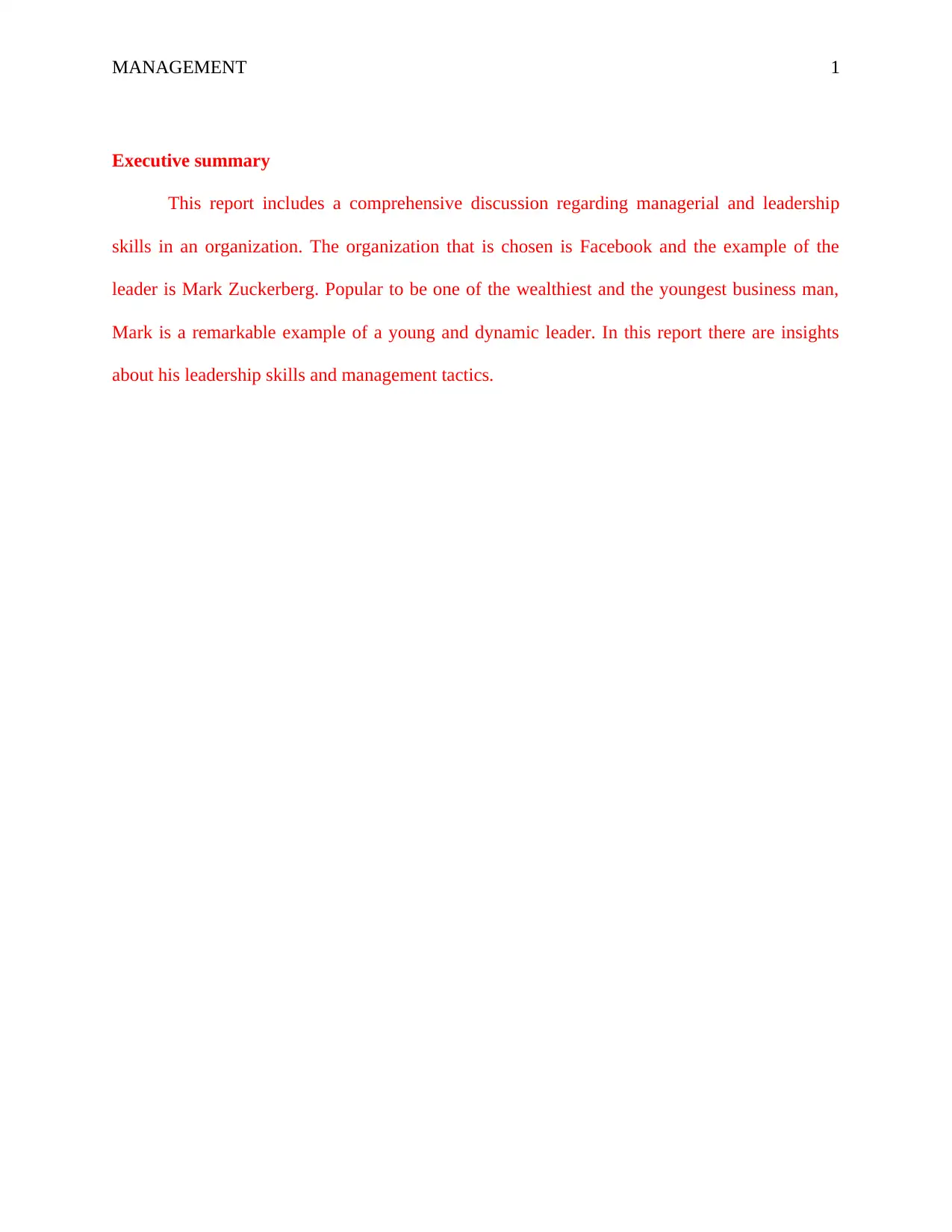
MANAGEMENT 1
Executive summary
This report includes a comprehensive discussion regarding managerial and leadership
skills in an organization. The organization that is chosen is Facebook and the example of the
leader is Mark Zuckerberg. Popular to be one of the wealthiest and the youngest business man,
Mark is a remarkable example of a young and dynamic leader. In this report there are insights
about his leadership skills and management tactics.
Executive summary
This report includes a comprehensive discussion regarding managerial and leadership
skills in an organization. The organization that is chosen is Facebook and the example of the
leader is Mark Zuckerberg. Popular to be one of the wealthiest and the youngest business man,
Mark is a remarkable example of a young and dynamic leader. In this report there are insights
about his leadership skills and management tactics.
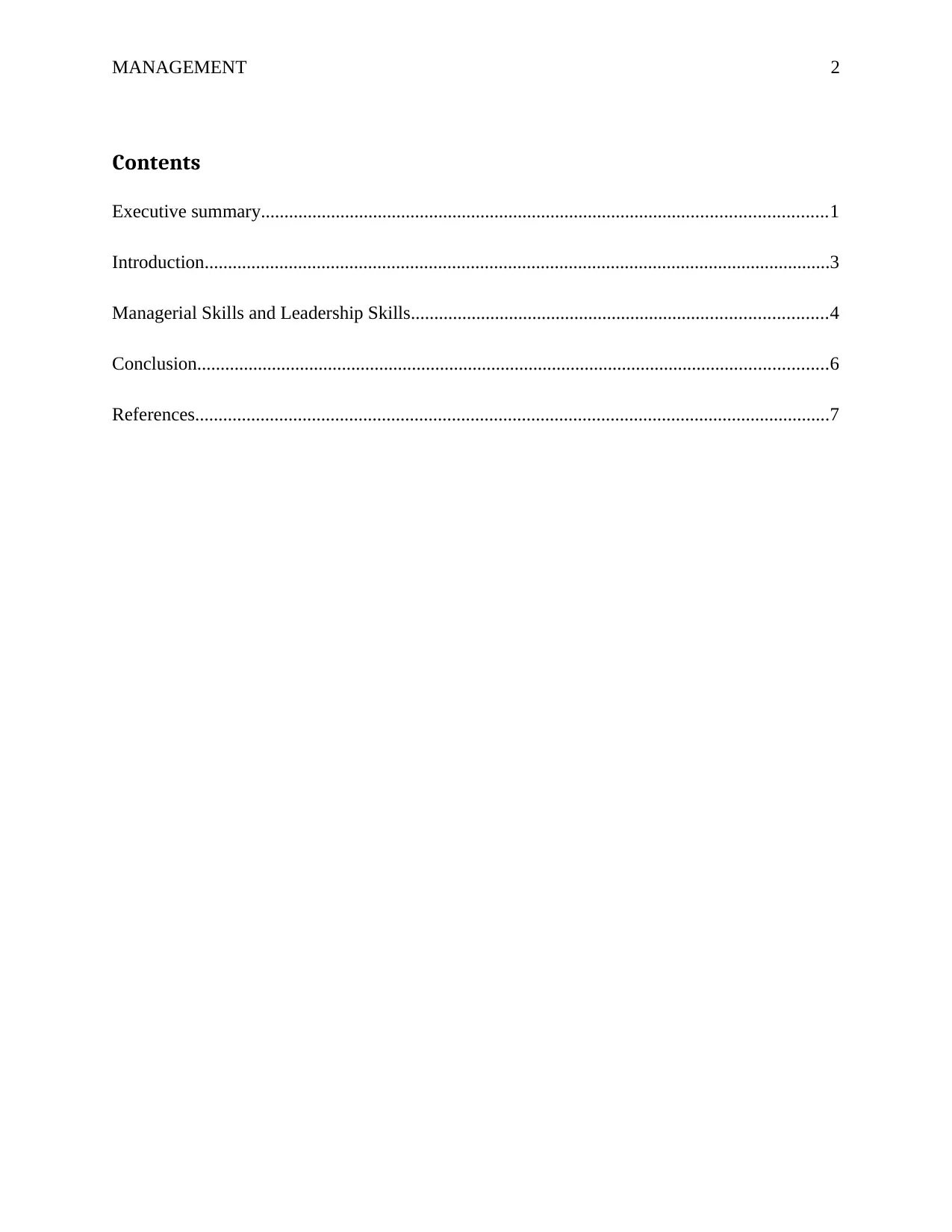
MANAGEMENT 2
Contents
Executive summary.........................................................................................................................1
Introduction......................................................................................................................................3
Managerial Skills and Leadership Skills.........................................................................................4
Conclusion.......................................................................................................................................6
References........................................................................................................................................7
Contents
Executive summary.........................................................................................................................1
Introduction......................................................................................................................................3
Managerial Skills and Leadership Skills.........................................................................................4
Conclusion.......................................................................................................................................6
References........................................................................................................................................7
⊘ This is a preview!⊘
Do you want full access?
Subscribe today to unlock all pages.

Trusted by 1+ million students worldwide
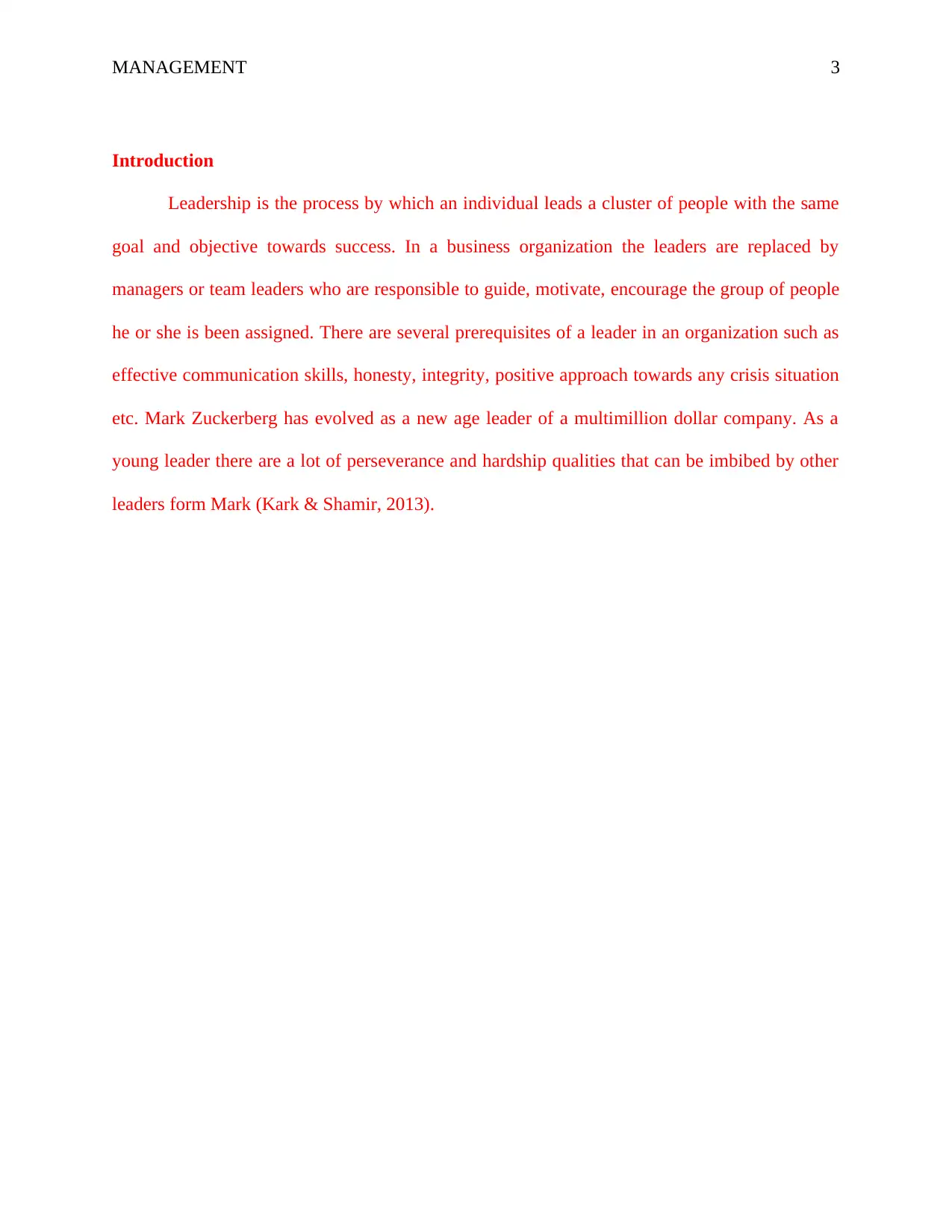
MANAGEMENT 3
Introduction
Leadership is the process by which an individual leads a cluster of people with the same
goal and objective towards success. In a business organization the leaders are replaced by
managers or team leaders who are responsible to guide, motivate, encourage the group of people
he or she is been assigned. There are several prerequisites of a leader in an organization such as
effective communication skills, honesty, integrity, positive approach towards any crisis situation
etc. Mark Zuckerberg has evolved as a new age leader of a multimillion dollar company. As a
young leader there are a lot of perseverance and hardship qualities that can be imbibed by other
leaders form Mark (Kark & Shamir, 2013).
Introduction
Leadership is the process by which an individual leads a cluster of people with the same
goal and objective towards success. In a business organization the leaders are replaced by
managers or team leaders who are responsible to guide, motivate, encourage the group of people
he or she is been assigned. There are several prerequisites of a leader in an organization such as
effective communication skills, honesty, integrity, positive approach towards any crisis situation
etc. Mark Zuckerberg has evolved as a new age leader of a multimillion dollar company. As a
young leader there are a lot of perseverance and hardship qualities that can be imbibed by other
leaders form Mark (Kark & Shamir, 2013).
Paraphrase This Document
Need a fresh take? Get an instant paraphrase of this document with our AI Paraphraser
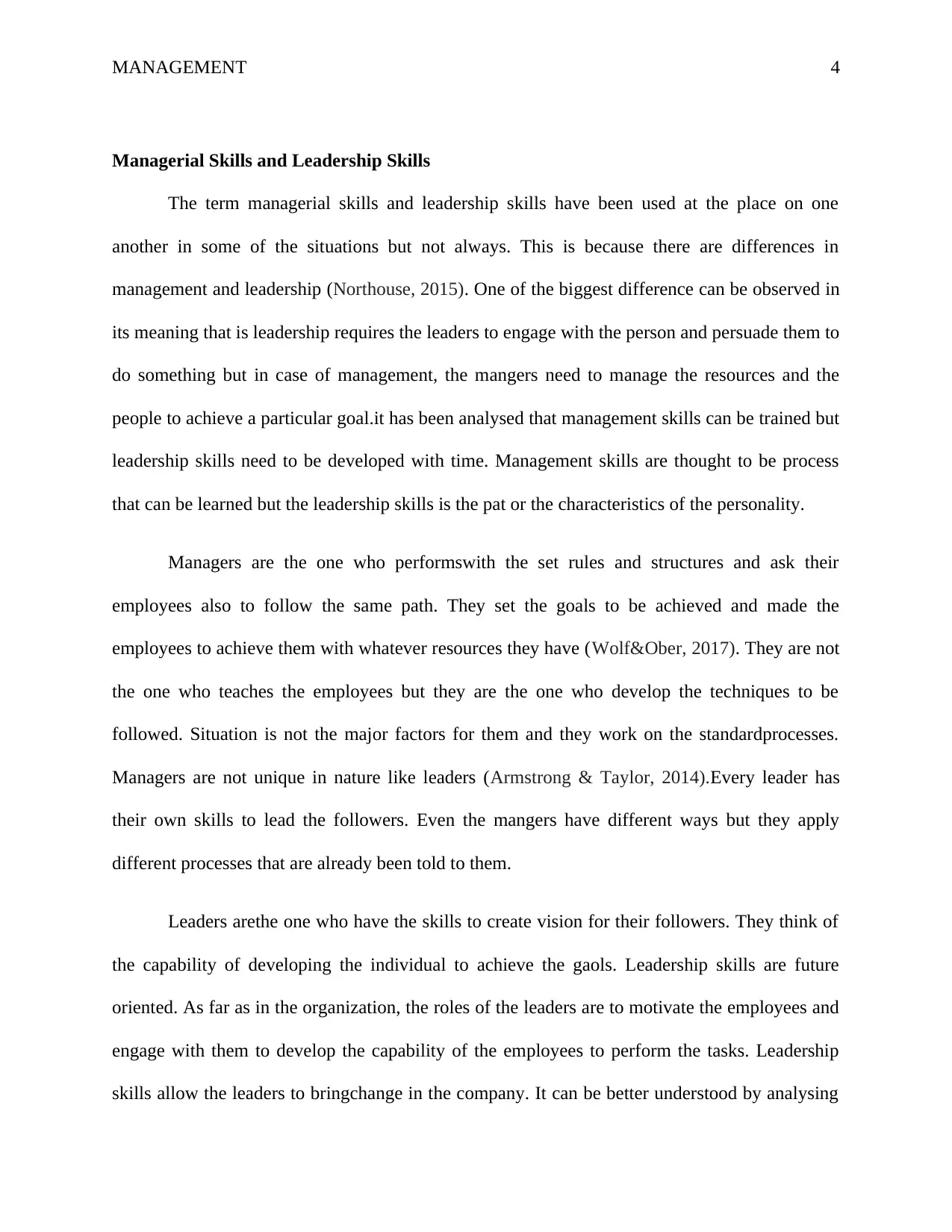
MANAGEMENT 4
Managerial Skills and Leadership Skills
The term managerial skills and leadership skills have been used at the place on one
another in some of the situations but not always. This is because there are differences in
management and leadership (Northouse, 2015). One of the biggest difference can be observed in
its meaning that is leadership requires the leaders to engage with the person and persuade them to
do something but in case of management, the mangers need to manage the resources and the
people to achieve a particular goal.it has been analysed that management skills can be trained but
leadership skills need to be developed with time. Management skills are thought to be process
that can be learned but the leadership skills is the pat or the characteristics of the personality.
Managers are the one who performswith the set rules and structures and ask their
employees also to follow the same path. They set the goals to be achieved and made the
employees to achieve them with whatever resources they have (Wolf&Ober, 2017). They are not
the one who teaches the employees but they are the one who develop the techniques to be
followed. Situation is not the major factors for them and they work on the standardprocesses.
Managers are not unique in nature like leaders (Armstrong & Taylor, 2014).Every leader has
their own skills to lead the followers. Even the mangers have different ways but they apply
different processes that are already been told to them.
Leaders arethe one who have the skills to create vision for their followers. They think of
the capability of developing the individual to achieve the gaols. Leadership skills are future
oriented. As far as in the organization, the roles of the leaders are to motivate the employees and
engage with them to develop the capability of the employees to perform the tasks. Leadership
skills allow the leaders to bringchange in the company. It can be better understood by analysing
Managerial Skills and Leadership Skills
The term managerial skills and leadership skills have been used at the place on one
another in some of the situations but not always. This is because there are differences in
management and leadership (Northouse, 2015). One of the biggest difference can be observed in
its meaning that is leadership requires the leaders to engage with the person and persuade them to
do something but in case of management, the mangers need to manage the resources and the
people to achieve a particular goal.it has been analysed that management skills can be trained but
leadership skills need to be developed with time. Management skills are thought to be process
that can be learned but the leadership skills is the pat or the characteristics of the personality.
Managers are the one who performswith the set rules and structures and ask their
employees also to follow the same path. They set the goals to be achieved and made the
employees to achieve them with whatever resources they have (Wolf&Ober, 2017). They are not
the one who teaches the employees but they are the one who develop the techniques to be
followed. Situation is not the major factors for them and they work on the standardprocesses.
Managers are not unique in nature like leaders (Armstrong & Taylor, 2014).Every leader has
their own skills to lead the followers. Even the mangers have different ways but they apply
different processes that are already been told to them.
Leaders arethe one who have the skills to create vision for their followers. They think of
the capability of developing the individual to achieve the gaols. Leadership skills are future
oriented. As far as in the organization, the roles of the leaders are to motivate the employees and
engage with them to develop the capability of the employees to perform the tasks. Leadership
skills allow the leaders to bringchange in the company. It can be better understood by analysing
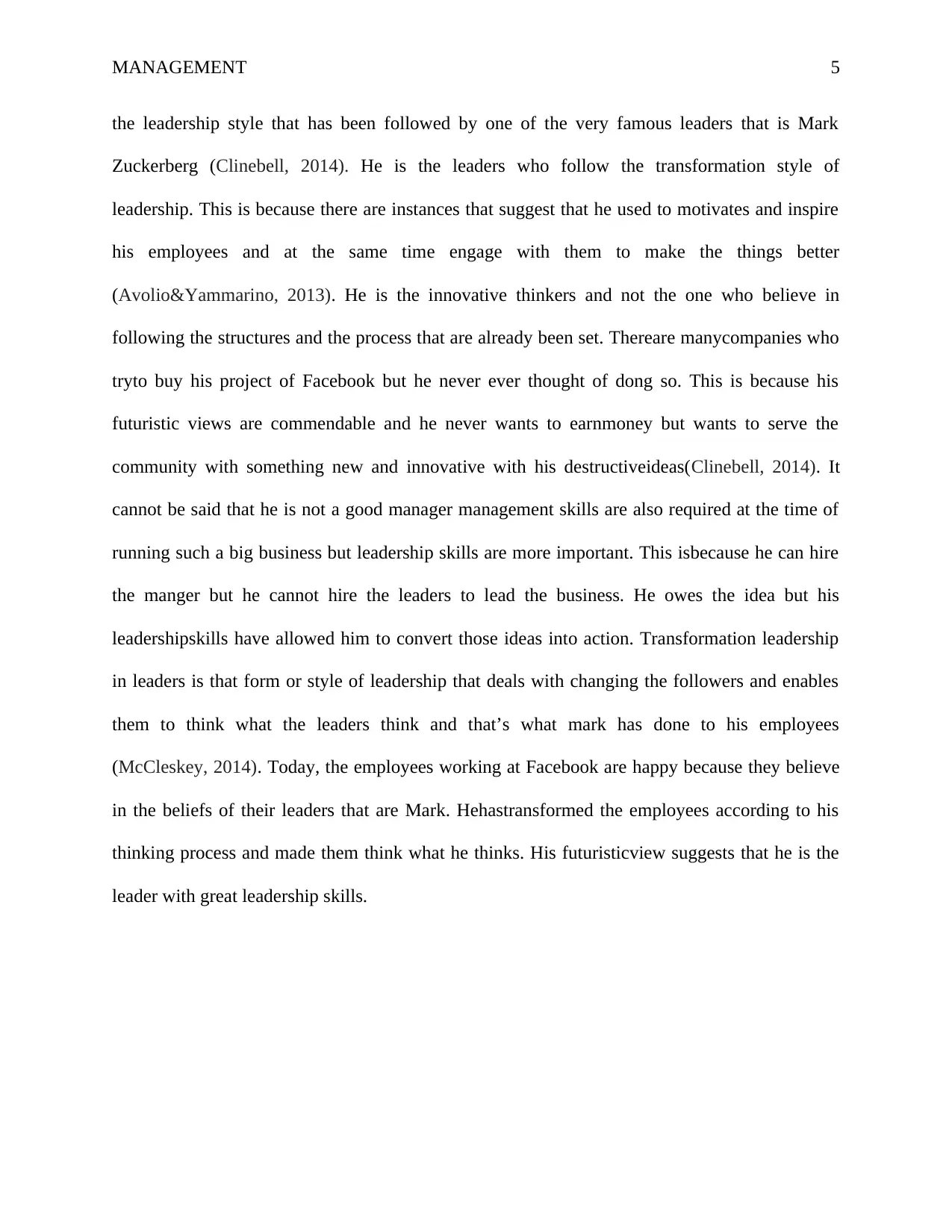
MANAGEMENT 5
the leadership style that has been followed by one of the very famous leaders that is Mark
Zuckerberg (Clinebell, 2014). He is the leaders who follow the transformation style of
leadership. This is because there are instances that suggest that he used to motivates and inspire
his employees and at the same time engage with them to make the things better
(Avolio&Yammarino, 2013). He is the innovative thinkers and not the one who believe in
following the structures and the process that are already been set. Thereare manycompanies who
tryto buy his project of Facebook but he never ever thought of dong so. This is because his
futuristic views are commendable and he never wants to earnmoney but wants to serve the
community with something new and innovative with his destructiveideas(Clinebell, 2014). It
cannot be said that he is not a good manager management skills are also required at the time of
running such a big business but leadership skills are more important. This isbecause he can hire
the manger but he cannot hire the leaders to lead the business. He owes the idea but his
leadershipskills have allowed him to convert those ideas into action. Transformation leadership
in leaders is that form or style of leadership that deals with changing the followers and enables
them to think what the leaders think and that’s what mark has done to his employees
(McCleskey, 2014). Today, the employees working at Facebook are happy because they believe
in the beliefs of their leaders that are Mark. Hehastransformed the employees according to his
thinking process and made them think what he thinks. His futuristicview suggests that he is the
leader with great leadership skills.
the leadership style that has been followed by one of the very famous leaders that is Mark
Zuckerberg (Clinebell, 2014). He is the leaders who follow the transformation style of
leadership. This is because there are instances that suggest that he used to motivates and inspire
his employees and at the same time engage with them to make the things better
(Avolio&Yammarino, 2013). He is the innovative thinkers and not the one who believe in
following the structures and the process that are already been set. Thereare manycompanies who
tryto buy his project of Facebook but he never ever thought of dong so. This is because his
futuristic views are commendable and he never wants to earnmoney but wants to serve the
community with something new and innovative with his destructiveideas(Clinebell, 2014). It
cannot be said that he is not a good manager management skills are also required at the time of
running such a big business but leadership skills are more important. This isbecause he can hire
the manger but he cannot hire the leaders to lead the business. He owes the idea but his
leadershipskills have allowed him to convert those ideas into action. Transformation leadership
in leaders is that form or style of leadership that deals with changing the followers and enables
them to think what the leaders think and that’s what mark has done to his employees
(McCleskey, 2014). Today, the employees working at Facebook are happy because they believe
in the beliefs of their leaders that are Mark. Hehastransformed the employees according to his
thinking process and made them think what he thinks. His futuristicview suggests that he is the
leader with great leadership skills.
⊘ This is a preview!⊘
Do you want full access?
Subscribe today to unlock all pages.

Trusted by 1+ million students worldwide
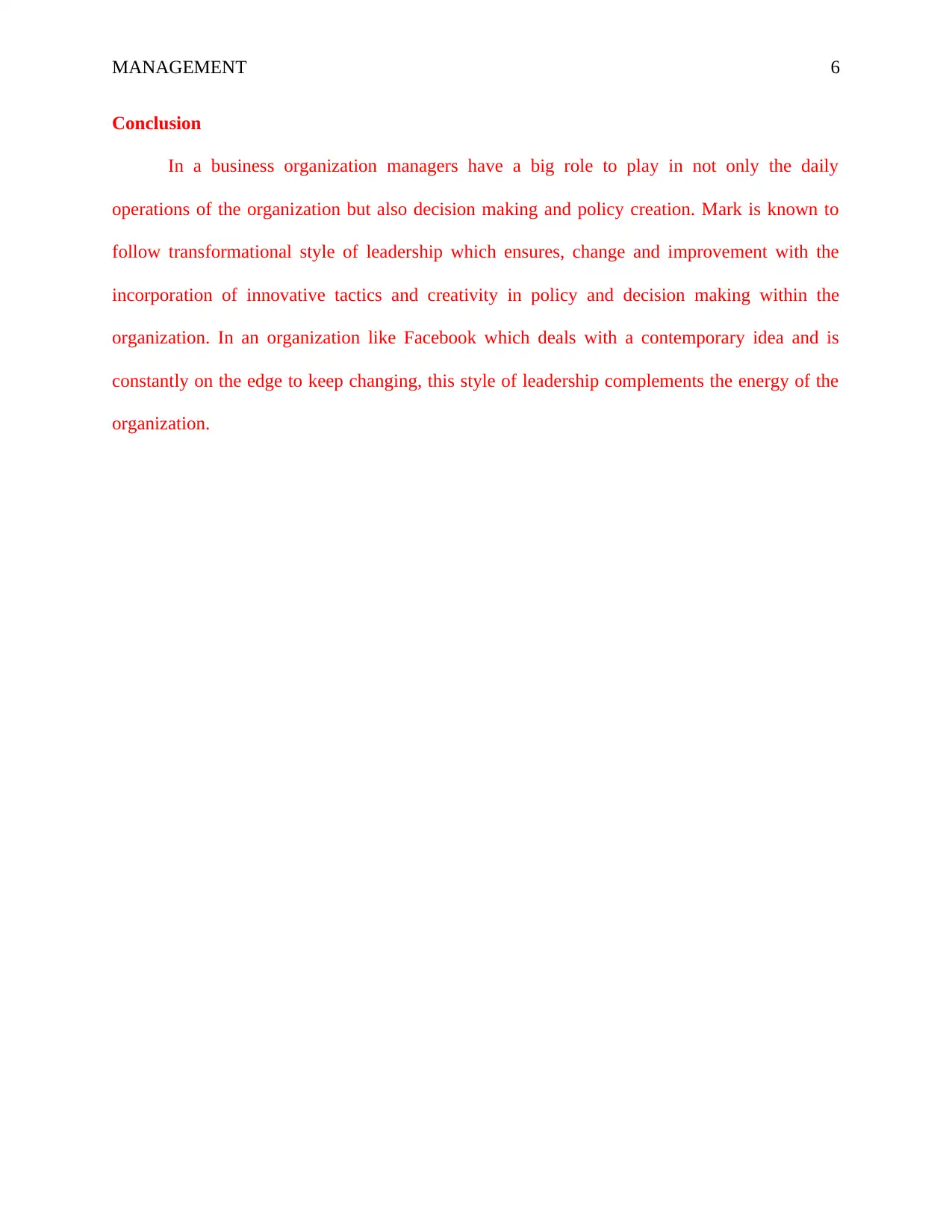
MANAGEMENT 6
Conclusion
In a business organization managers have a big role to play in not only the daily
operations of the organization but also decision making and policy creation. Mark is known to
follow transformational style of leadership which ensures, change and improvement with the
incorporation of innovative tactics and creativity in policy and decision making within the
organization. In an organization like Facebook which deals with a contemporary idea and is
constantly on the edge to keep changing, this style of leadership complements the energy of the
organization.
Conclusion
In a business organization managers have a big role to play in not only the daily
operations of the organization but also decision making and policy creation. Mark is known to
follow transformational style of leadership which ensures, change and improvement with the
incorporation of innovative tactics and creativity in policy and decision making within the
organization. In an organization like Facebook which deals with a contemporary idea and is
constantly on the edge to keep changing, this style of leadership complements the energy of the
organization.
Paraphrase This Document
Need a fresh take? Get an instant paraphrase of this document with our AI Paraphraser
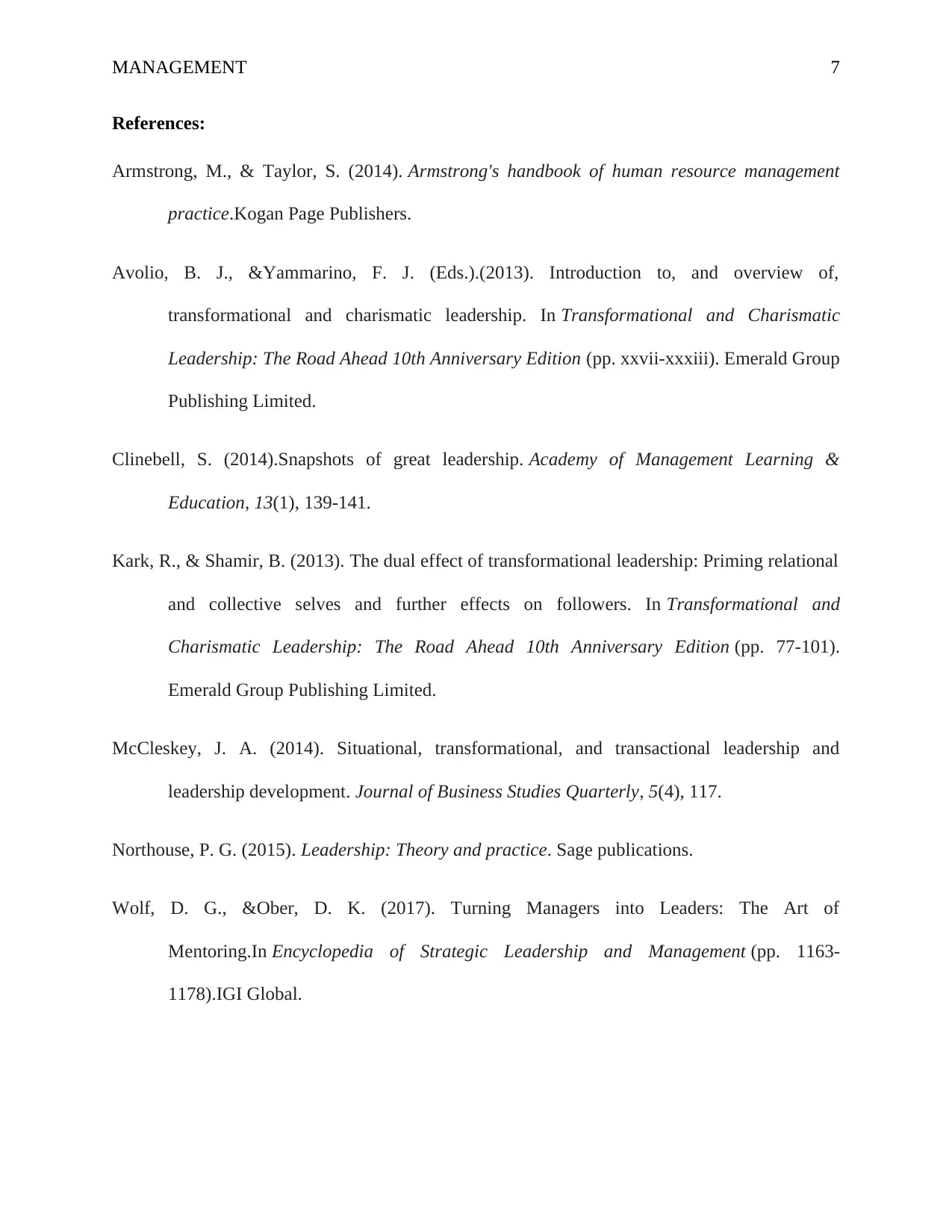
MANAGEMENT 7
References:
Armstrong, M., & Taylor, S. (2014). Armstrong's handbook of human resource management
practice.Kogan Page Publishers.
Avolio, B. J., &Yammarino, F. J. (Eds.).(2013). Introduction to, and overview of,
transformational and charismatic leadership. In Transformational and Charismatic
Leadership: The Road Ahead 10th Anniversary Edition (pp. xxvii-xxxiii). Emerald Group
Publishing Limited.
Clinebell, S. (2014).Snapshots of great leadership. Academy of Management Learning &
Education, 13(1), 139-141.
Kark, R., & Shamir, B. (2013). The dual effect of transformational leadership: Priming relational
and collective selves and further effects on followers. In Transformational and
Charismatic Leadership: The Road Ahead 10th Anniversary Edition (pp. 77-101).
Emerald Group Publishing Limited.
McCleskey, J. A. (2014). Situational, transformational, and transactional leadership and
leadership development. Journal of Business Studies Quarterly, 5(4), 117.
Northouse, P. G. (2015). Leadership: Theory and practice. Sage publications.
Wolf, D. G., &Ober, D. K. (2017). Turning Managers into Leaders: The Art of
Mentoring.In Encyclopedia of Strategic Leadership and Management (pp. 1163-
1178).IGI Global.
References:
Armstrong, M., & Taylor, S. (2014). Armstrong's handbook of human resource management
practice.Kogan Page Publishers.
Avolio, B. J., &Yammarino, F. J. (Eds.).(2013). Introduction to, and overview of,
transformational and charismatic leadership. In Transformational and Charismatic
Leadership: The Road Ahead 10th Anniversary Edition (pp. xxvii-xxxiii). Emerald Group
Publishing Limited.
Clinebell, S. (2014).Snapshots of great leadership. Academy of Management Learning &
Education, 13(1), 139-141.
Kark, R., & Shamir, B. (2013). The dual effect of transformational leadership: Priming relational
and collective selves and further effects on followers. In Transformational and
Charismatic Leadership: The Road Ahead 10th Anniversary Edition (pp. 77-101).
Emerald Group Publishing Limited.
McCleskey, J. A. (2014). Situational, transformational, and transactional leadership and
leadership development. Journal of Business Studies Quarterly, 5(4), 117.
Northouse, P. G. (2015). Leadership: Theory and practice. Sage publications.
Wolf, D. G., &Ober, D. K. (2017). Turning Managers into Leaders: The Art of
Mentoring.In Encyclopedia of Strategic Leadership and Management (pp. 1163-
1178).IGI Global.
1 out of 8
Related Documents
Your All-in-One AI-Powered Toolkit for Academic Success.
+13062052269
info@desklib.com
Available 24*7 on WhatsApp / Email
![[object Object]](/_next/static/media/star-bottom.7253800d.svg)
Unlock your academic potential
Copyright © 2020–2026 A2Z Services. All Rights Reserved. Developed and managed by ZUCOL.





